Launch A ‘Discount Codes’ Page & Reduce Your Affiliate Commissions
16 min read
Last Updated: October 6, 2023

eCommerce brands are giving away thousands every month in affiliate commissions as a result of discount code sites ranking for [‘brand’ + discount code] queries on the SERPs.
If you run any sort of discounts via affiliates, you NEED to implement this tactic. In this guide, I’ll show you an example of how one retailer could use this to increase their revenue by at least £400,000 each year.
Here’s a look at how you can reduce your brand’s affiliate payouts without losing these sales by ranking your own domain for these keywords, and it’s as easy as creating a ‘discount codes’ page and keeping it updated with the latest codes and offers.
Discount Code Searches = Big Business
Take a quick look at the monthly search volume data from Semrush for the most popular ‘discount code’ searches in the UK market:
| Query | MSV |
|---|---|
| Asos Discount Code | 165,000 |
| Boohoo Discount Code | 110,000 |
| Deliveroo Discount Code | 74,000 |
| Argos Discount Code | 60,500 |
| Matalan Discount Code | 60,500 |
| Shein Discount Code | 60,500 |
| Boots Discount Code | 49,500 |
| Just Eat Discount Code | 49,500 |
| Look Fantastic Discount Code | 49,500 |
| Moonpig Discount Code | 49,500 |
The list of brands isn’t anything unusual; those retailers you’d expect to be there are being searched for.
But let’s dive in a little deeper.
Let’s now look at which of these brands actually see their own domain rank on the SERPs for the query with a ‘discount codes’ page and whether or not they actually have a page on their site that lists current codes.
| Query | MSV | Domain’s Ranking Position | Discount Codes Page? |
|---|---|---|---|
| ASOS Discount Code | 165,000 | 7 | N |
| Boohoo Discount Code | 110,000 | 3 | Y |
| Deliveroo Discount Code | 74,000 | 100+ | N |
| Argos Discount Code | 60,500 | 1 | Y |
| Matalan Discount Code | 60,500 | 2 | Y |
| Shein Discount Code | 60,500 | 100+ | N |
| Boots Discount Code | 49,500 | 100+ | N |
| Just Eat Discount Code | 49,500 | 100+ | N |
| Look Fantastic Discount Code | 49,500 | 1 | Y |
| Moonpig Discount Code | 49,500 | 2 | Y |
What stands out the most here?
Those brands who have published their own ‘discount codes’ page are, for the most part, seeing top rankings.
And whilst we do see, in some cases, dedicated voucher code sites outranking brands’ own domains, we’ll look at some of the reasons why this might be shortly.
What’s Happening When Someone Searches for a Discount Code Then Buys From You?
To help get buy-in on this tactic, it’s often useful to first put yourself in the position of the customer who is searching for your brand’s discount code and understanding their journey.
So let’s do just that.
We’ll use ‘Shein Discount Code’ given that they’re currently not using this tactic, as it helps us to see the opportunity.
But what we need to consider is that this customer is ready to buy! If someone is at the stage of searching for a discount code, they know exactly what they want to buy and where they want to buy it from.
They’re simply looking to save money on their order. They’re ultimately (unless they find a better discount for the same product from another retailer) going to buy from this store, and they don’t care where they find a working discount code from.
Remember, most consumers have no idea how affiliate marketing works, nor do they need to.
But let’s go through the process…
Searching Google for ‘Shein Discount Code’
Let’s run a search on Google for the query ‘Shein discount code.’ Here are the top 5 organic results on the SERPs, as well as ads and other features:
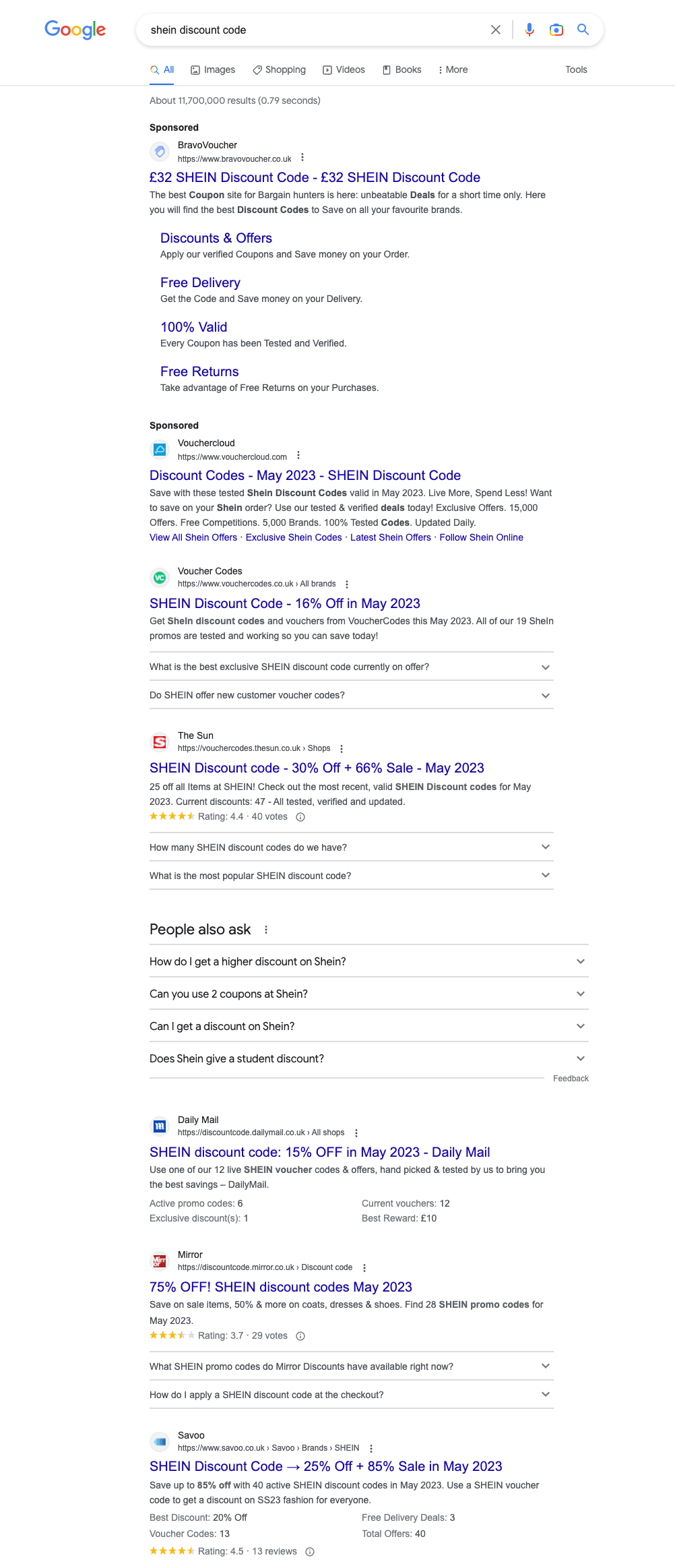
Clicking onto the top organic result
Let’s ignore the paid results for a moment and jump straight to the top organic result, VoucherCodes.co.uk.
Here’s what we see:
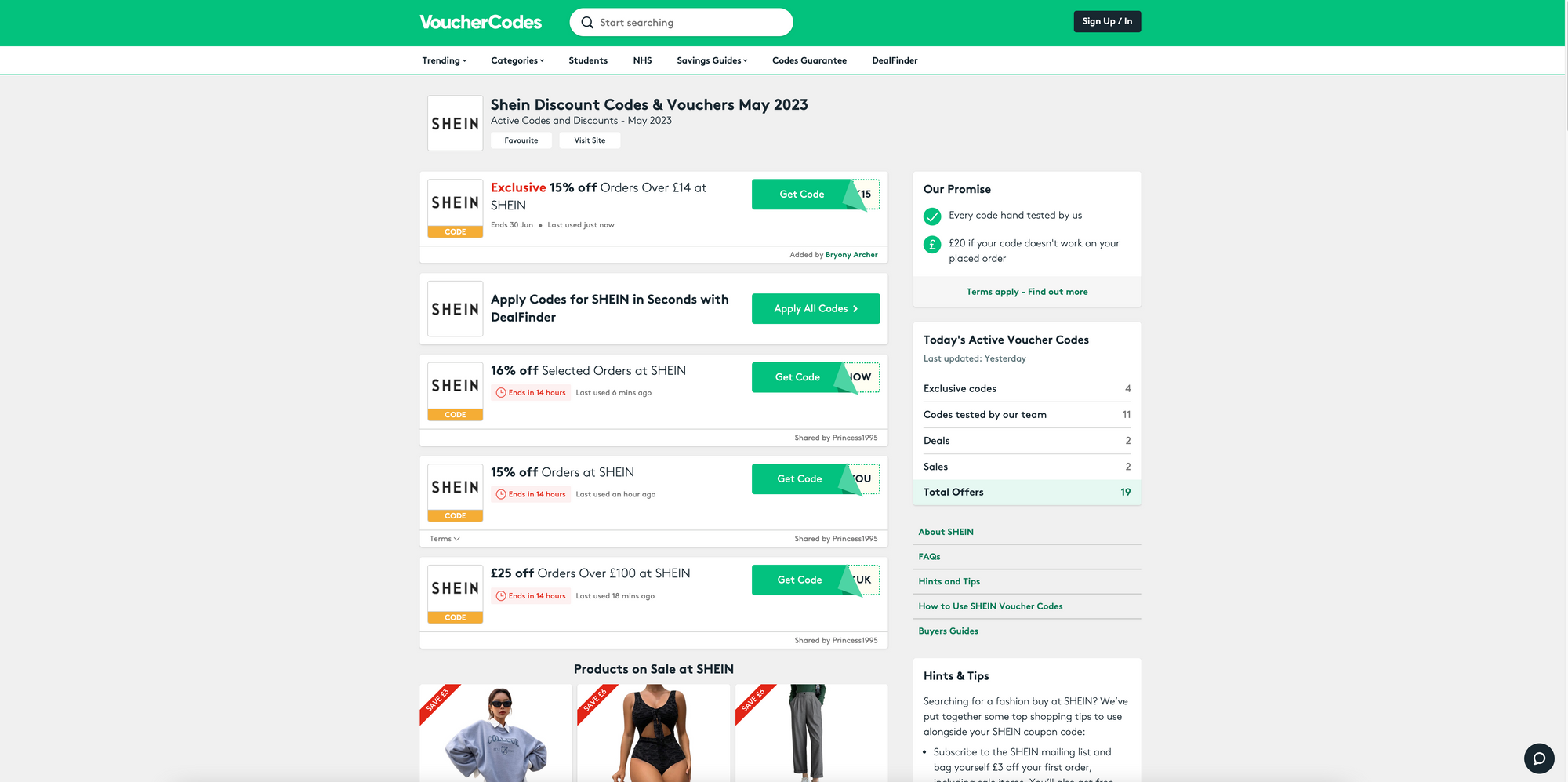
That top code? Click to get it, and we see:
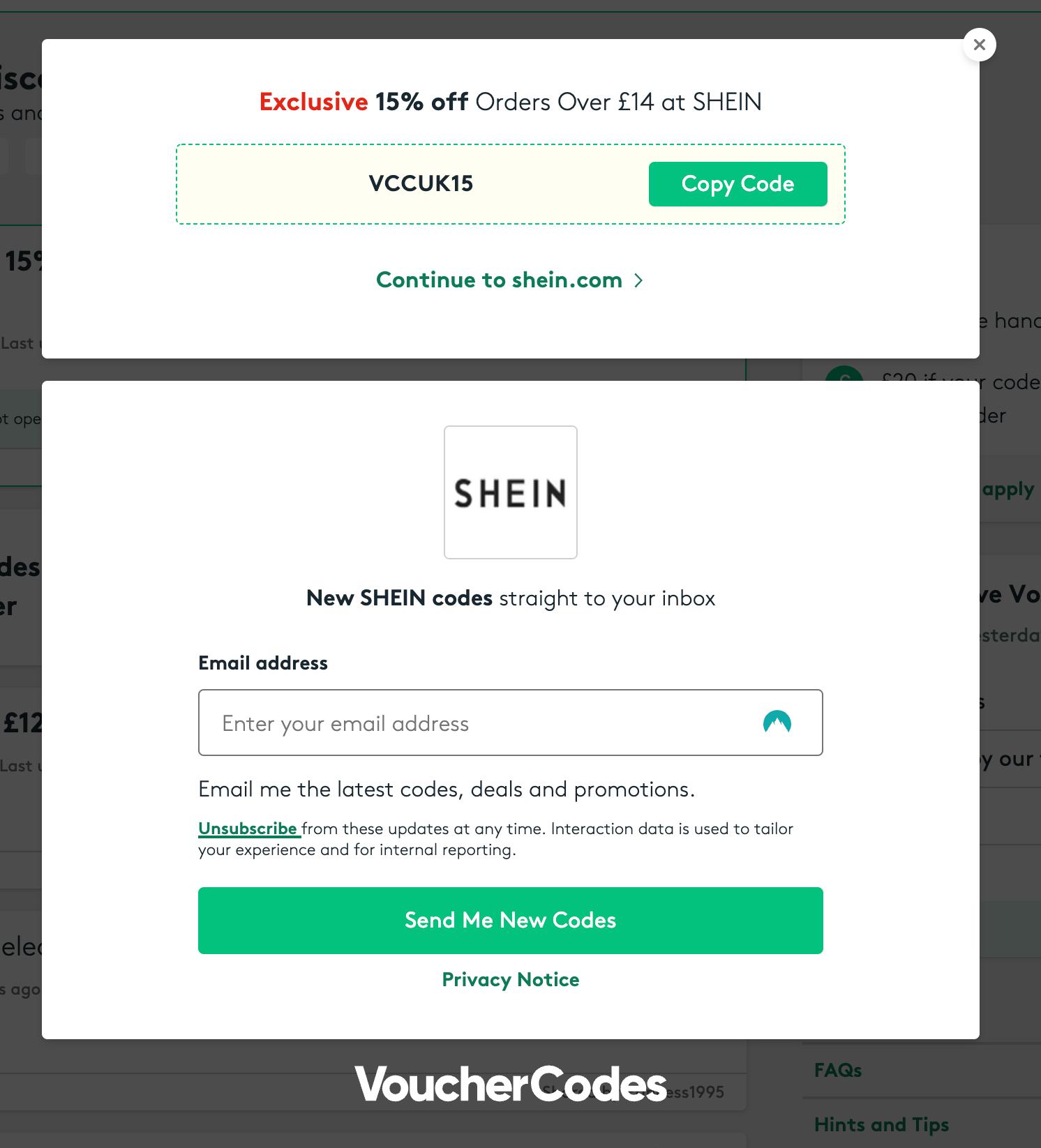
Click ‘Continue to shein.com’ and you’re back on the retailers website, ready to use your discount.
Shopping on the retailer’s site
So right now, Shein is offering their own discounts once you land on their homepage:
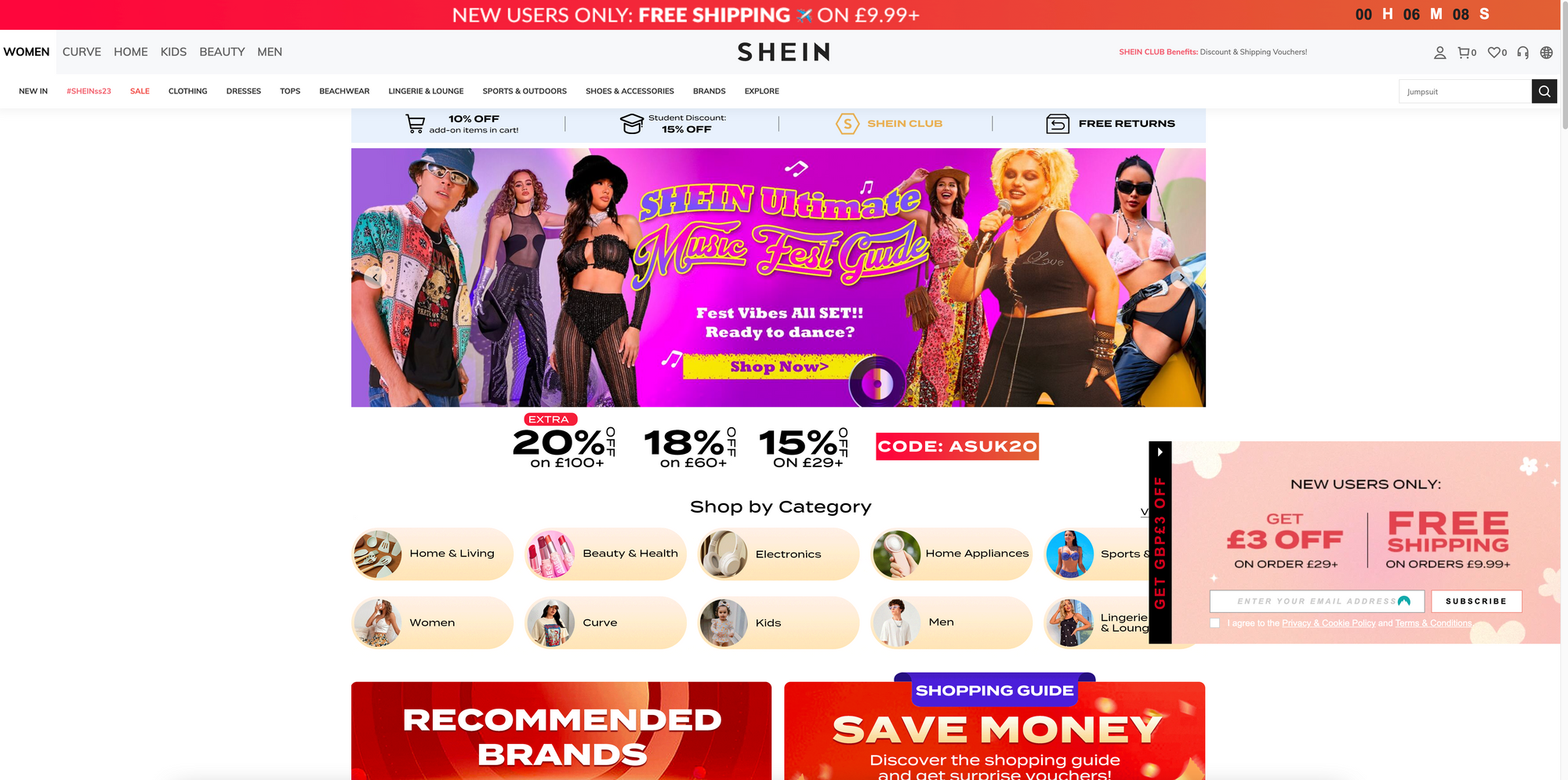
But let’s compare the discounts available:
- VoucherCodes.co.uk code = 15% off orders over £14
- £3 off orders over £29 for new users
- 20% off orders over £100
- 18% off orders over £60
- 15% off orders over £29
Unless you’re spending over £60, the VoucherCodes.co.uk code gives you the 15% discount at a lower order threshold – £14 rather than £29.
Yes, Shein are offering discounts directly, but there’s a real incentive here for customers who have already grabbed the code from VoucherCodes.co.uk to use that one; the lower limit.
Now we could stop there and accept that the lower order value orders will use that code from the affiliate and assume that those who are spending more will use the discounts on offer directly from Shein.
And they probably will, but there’s one more thing to remember.
This customer clicked that link on VoucherCodes.co.uk.
It doesn’t matter which code they use once they land on the site after clicking the link. There will be a commission due to VoucherCodes.co.uk regardless of whether they use the code served via their platform or the one straight from Shein.
That link click is all that’s needed to trigger the commission, not the code use.
And once we take the time to understand this, we can quickly see why getting those clicks for a [‘brand’ + discount code] search organically makes SO MUCH SENSE!
Let’s run the numbers here, assuming a customer clicked on the VoucherCodes.co.uk link and seeing that the Shein affiliate program pays ‘10%~20% commission on each referred sale.’
Let’s calculate this:
- A customer searches ‘Shein discount code’ and lands on VoucherCodes.co.uk – they see the 15% discount
- They click the link, but then see the 20% discount on offer if spending over £100.
- They place an order of £100 and save £20.
- This gives Shein £80 revenue from this order.
- But because of that affiliate link click, they owe VoucherCodes.co.uk between 10% and 20%; that’s between £8 and £16.
- Revenue is down to somewhere between £72 and £64.
If this customer had landed straight on Shein’s site when running their initial search for a discount code, the retailer would have generated an additional £8 to £16 revenue.
This stacks up.
Semrush estimates that the VoucherCodes.co.uk page that ranks top for these queries gets 47,800 organic clicks per month.

These customers are ready to buy. But let’s give benefit of the doubt and say that a very low 25% of these visits go on to buy (reality is, it’s going to be much, much higher than this).
That’s 11,950 orders each month.
Of course, not every one of these is going to be spending £100+, so let’s assume an AOV of £30 – just above the £29 threshold that most vouchers are set at (I’m assuming these are being used to push up the AOV).
11,950 orders at £30 is £358,500 in revenue JUST from clicks from the VoucherCodes.co.uk page.
And that’s somewhere between £35,850 and £71,700 commission that’s owed by Shein every month.
Wow.
This is just one discount code site, too.
Even if Shein managed to pick up 50% of those clicks by ranking in the #1 spot for ‘Shein discount code’ they could increase the businesses revenue by between £17,925 and £35,850 every month. Or £215,100 to £430,200 every year.
The reality is that this additional revenue will likely be much higher, but even using a simple working out and conservative assumptions, the opportunity is clear.
The Economics Behind Discount Voucher Affiliates – The Scale of the Opportunity
Give or take, your brand’s own domain is always going to rank at the top of the SERPs for partially branded queries – of which [‘brand’ + discount code] is one of these.
So why isn’t a ‘discount codes’ page something that more SEOs are creating as standard?
I’ve put this tactic to a number of clients in the past and have sometimes been met with objections, with these including:
- “We want to drive non-brand growth, and discount code queries are branded.”
- “We’ll be taking attributed revenue away from our affiliate team.”
- “We don’t want to lose the traffic these affiliate partners are sending us.”
- “We don’t want a discount codes page on our site. That’s just giving away discounts unnecessarily.”
Don’t get me wrong, these are all valid concerns – but to really understand why you need to go ahead and launch a discount codes page today, we need to look at these objections in more detail, and put some numbers behind the decisions.
But first, let’s create a working example. Let’s assume that:
- Your AOV is £100
- You’re offering a 10% discount code on Vouchercloud or similar platforms
- You’re giving 10% commission to these affiliates
This means that, for every sale that’s generated via a discount code site:
- Your AOV is £90 after the 10% discount
- You’re giving £9 commission to the affiliate (10% of the order value)
- This leaves £81 revenue
Keep note of these numbers; I’m going to show examples of how different scenarios can impact the revenue you’re left with.
But simplistically, let’s now assume that you’re able to capture these sales via organic search rather than via an affiliate. Here’s what happens:
- Your AOV is £90 after the 10% discount
- You’re no longer giving any affiliate commission on the sale
- This leaves £90 revenue – you’re £9 up per order when generating the sale via organic search
You can quickly see how this stacks up. Even in this simple example, we can see that ever order that you pick up via organic rather than via an affiliate brings in £9 extra revenue – what’s not to love about this?
Anyway, back to the objections that we’re often met with when proposing to create and rank a discount codes page…
Overcoming Objection 1: Discount Code Queries are Branded
I totally get that, in many cases, the goal of SEO is usually to increase non-brand traffic and revenue.
BUT, dismissing opportunities around branded (or partially-branded) queries is narrow-minded.
A successful SEO strategy is one that increases revenue, and one of the key things to do when looking at branded opportunities is whether organic search is a more cost-effective channel than another.
If it’s cheaper to acquire a sale via a branded organic search than via another channel, then who cares if it’s not a non-branded query?
This is why it’s so important to put data behind your suggestions; data doesn’t lie.
No one’s suggesting you go and cancel your affiliate agreements with the discount code sites, just that you ensure you’ve launched your own page and aim to outrank these sites, in turn grabbing the bulk of the traffic yourself.
Overcoming Objection 2: Taking Away Revenue from Your Affiliate Team
Smart marketers acquire sales at the lowest possible cost, and when it comes to a customer searching a discount code query, this acquisition is always going to be cheaper via organic search than via an affiliate partner.
I totally understand that there can often be an ‘attribution fight’ between teams, especially when multiple touch points are involved.
But at the end of the day, decisions should be backed up by data and when you’re able to demonstrate the commission savings by acquiring these sales via organic search, it’s easier to get buy-in.
Now more than ever, no business should be giving away revenue they don’t need to.
Have an open conversation between teams and base these around figures. Do what’s right for the business.
Overcoming Objection 3: Preventing a Loss of Affiliate Traffic
A genuine concern is whether or not the traffic that’s picked up organically will like-for-like replace the traffic being sent by affiliate partners.
And this is probably the easiest objection to overcome…
As I’ve already mentioned, no one is suggesting you should cancel your affiliate agreements, ask voucher code sites to remove their pages or that you stop seeding codes into them.
Not at all.
What I’m suggesting here is that you launch your own discount codes page in addition to your relationship with affiliates.
Ideally, this page ranks at the top of the SERPs and you pick up the bulk of the traffic searching for codes directly to your own site. For traffic you don’t pick up yourself (some searchers will naturally gravitate straight to the code sites), the scenario is the same as it was before – discount + commission.
You can’t lose.
Overcoming Objection 4: Giving Away Unnecessary Discounts
Quite rightly, some retailers are often nervous about unnecessarily promoting discounts to those who aren’t actively looking for them.
I’ve worked with numerous clients in the past who are offering discounts via third-parties but not directly on their own site.
But let’s just consider one thing…
If someone is searching for a discount code, they intend to use one if they find it. The best-case scenario is that they find that code from you and you’re not paying out a commission.
Our goal here is to rank at the top of the SERPs for [‘brand’ + discount code] queries. Not for you to go and plaster discounts all over your site (unless that’s part of your strategy).
I’ve successfully executed this tactic without even including a link to the page in the site’s footer or main navigation. Be sure to consider this.
And whilst I’m not saying you want to create this as an orphan page (you don’t), consider linking to the page from your HTML sitemap to get it indexed. In most cases, as it’s a partially branded query, you shouldn’t find it hard to rank the page.
Structuring Your Discount Codes Page
So, you’re convinced. You’re going to go ahead and get the buy-in from your boss or client to go launch and rank a discount codes page, right?
Before you do, take a moment to consider how to structure this page.
If all you do is spin up a quick page that includes a list of current codes, you’ll be missing out on opportunities, both in terms of ensuring you outrank the discount code sites, but also from a conversion perspective.
Below, I’ll share some examples of awesome discount code pages that have been launched by retailers, as well as giving a quick blueprint you can use for your own page.
Analysing Top-Ranked Discount Code Pages
One of the most effective things you can do as an SEO is to look at what’s working for others to help inspire your own efforts.
Here are a few examples of discount code pages that perform well on the SERPs that you can draw inspiration from:
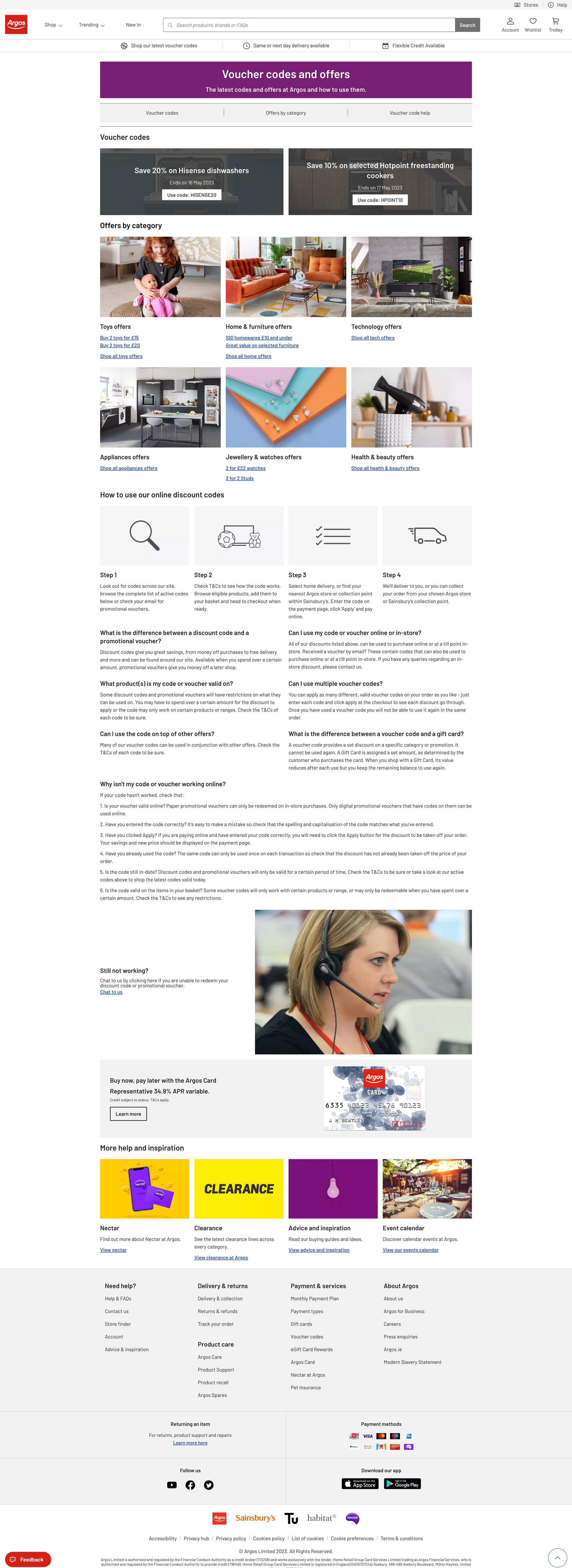
Argos’ discount codes page is a great example of going above and beyond simply listing current codes.
There’s a clear focus on pushing users towards the latest deals and discounts on a category-by-category basis (essential for a retailer who serves multiple different customer groups), as well as a simple overview on how to use the codes.
Including common FAQs as well as a troubleshooting guide on why codes might not work not only serves users’ needs but helps to get relevant content onto the page. Helpful content, I might add.
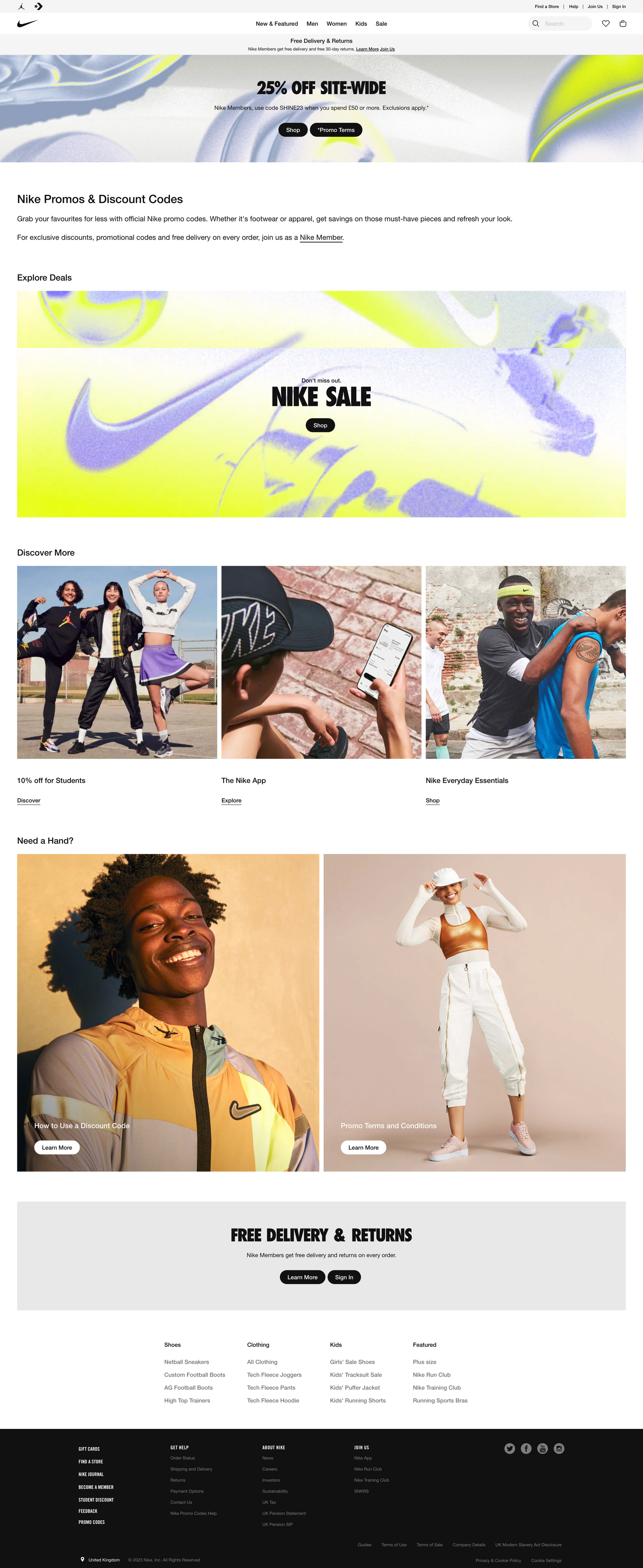
Nike has gone for the simple approach, but it works!
Led by strong visuals, users can clearly see the offers available and what they need to do in order to grab these.
They’re linking out to the ‘how to use’ and ‘terms’ content, which some brands are including on the page itself, but either way, it’s effective, and it’s ranking!
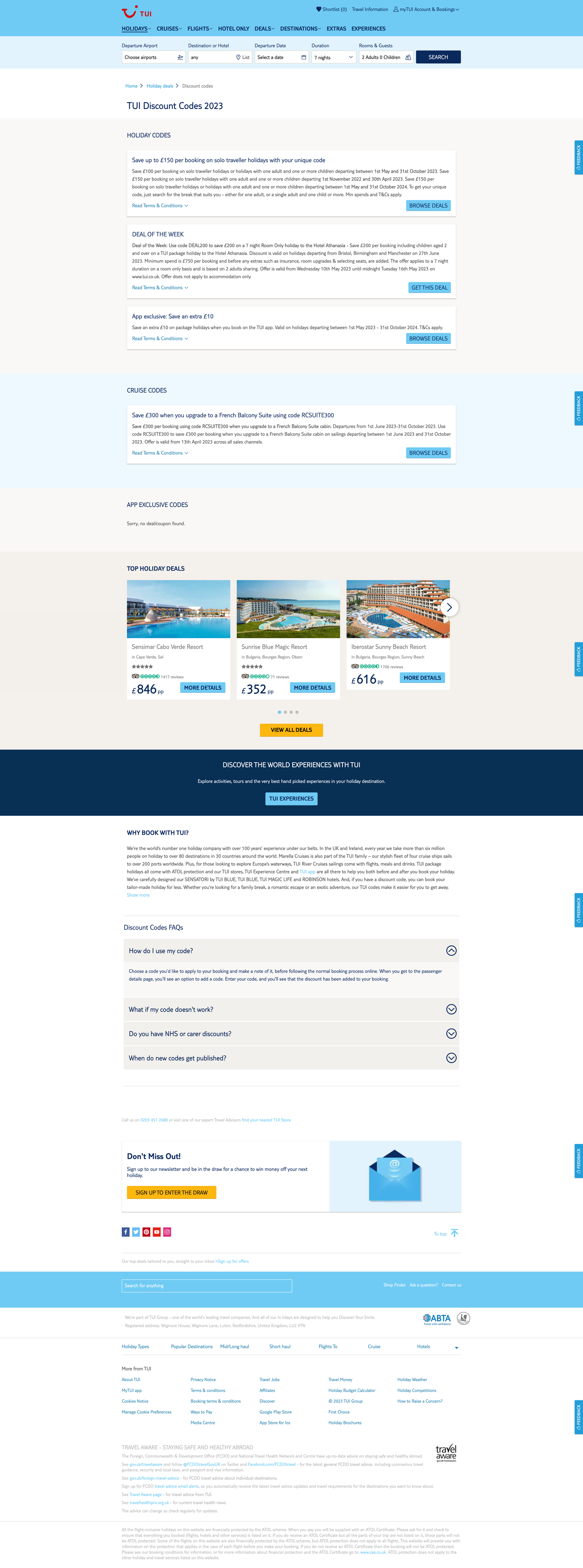
We’re seeing a common trend here; that users have questions about using discount codes and your own page is the perfect place to host these.
TUI is breaking down the current discounts by holiday type, which works brilliantly for users who know what they’re looking for, and clicking the ‘browse deals’ button takes you straight there.
This example goes to show that you don’t need to overcomplicate things, and that what users really want is to find relevant codes. Put the user first and you’ll win.

Interestingly, Travelodge doesn’t look to actively be sharing discount codes, as such, but they’re still ranking their own deals page for relevant queries.
And unlike some of the other examples, what we see here is more of a ‘deals hub,’ and for the brand, it works perfectly.
When a user starts their search for ‘Travelodge discount code,’ they land on the page before being directed to specific deal pages; London, city breaks, beaches, countryside etc.
And whilst these don’t take you to a codes page, they’re absolutely serving the user’s requirement by helping them to find the best prices for that type of stay.
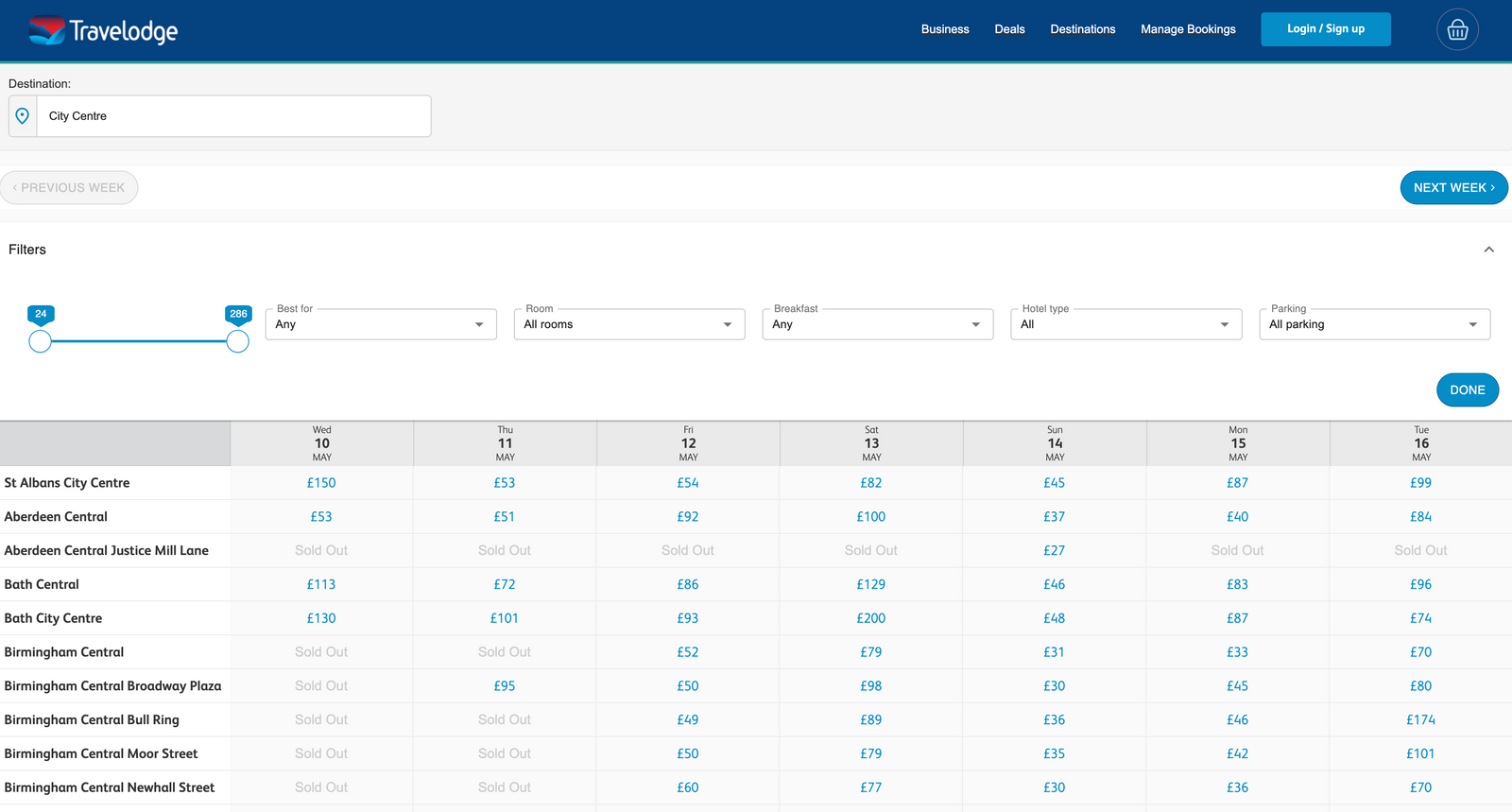
It’s all about thinking outside of the box and looking at effective ways to grab the search traffic that’s available.
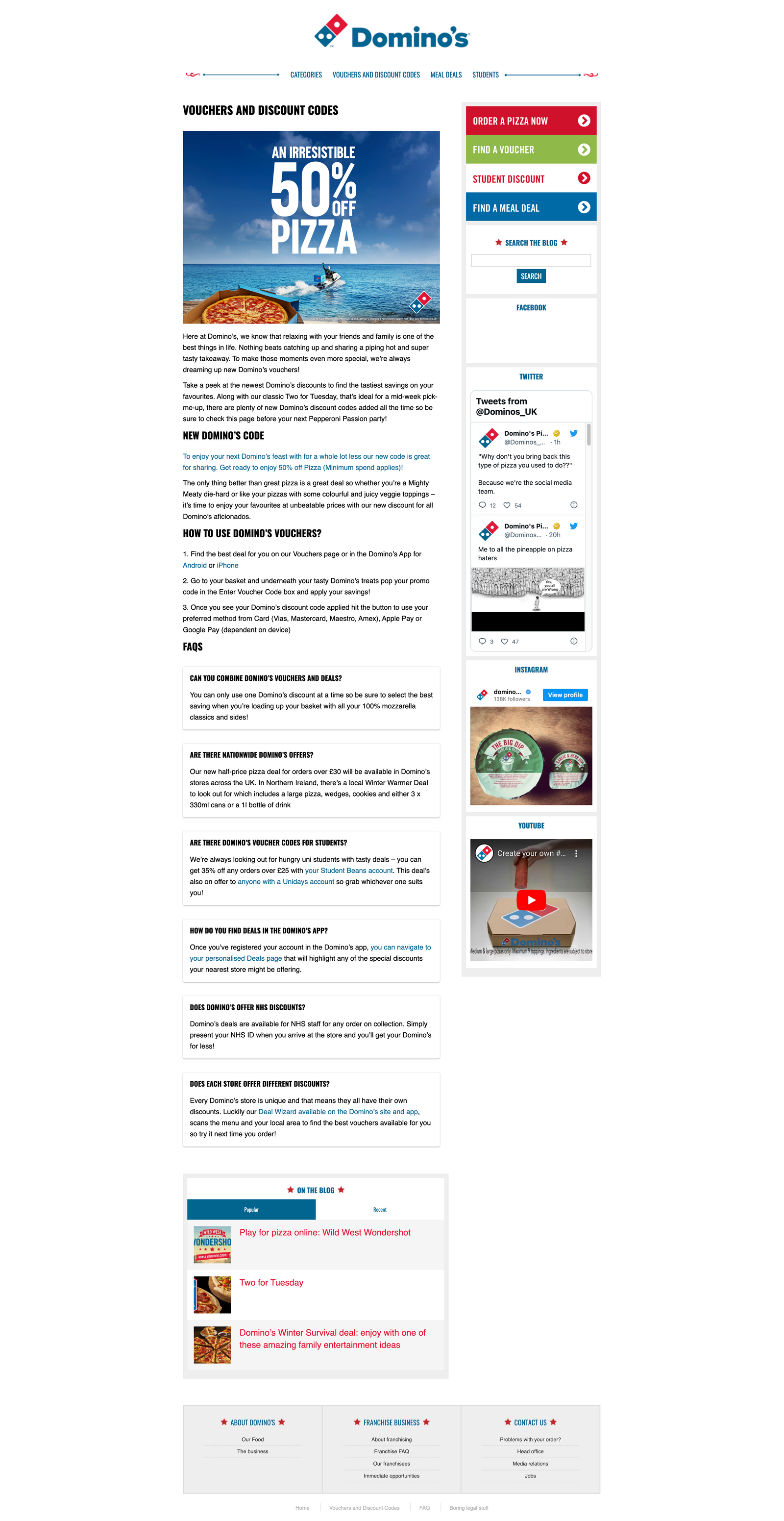
Dominos hosts their discount codes page on their blog, and it works!
All this really is is a simple visual of the latest offer, alongside a short guide on using the codes and FAQs.
The reality is that you could put something like this together in less than an hour. And think about the ROI on that?!
What to Include on Your Discount Codes Page
We’ve seen that there are different ways to go about creating a discount codes page that ranks and converts, but there are a few common things you should consider including:
- An optimised title and H1 tag of ‘[Brand] Discount Codes & Offers’
- Intro text that outlines the codes or offers – are they exclusive? Are the best offers available direct?
- A list (or link to) current codes and offers – if there are different offers by category, link out to all of these
- A quick summary on how to use the codes
- FAQs
Get these things right, and you’re using the winning formula for discount code pages that rank at the top of the SERPs.
Reporting on the Impact & Financial Wins
The success of any SEO tactic really comes down to its ROI, and reporting on the impact on revenue of anything you implement is key.
And to calculate the impact of your discount codes page; it’s as simple as reporting on the reduction in affiliate commissions you’re seeing.
This tactic’s success is all about reducing the commission payouts and recovering the revenue that was previously driven via affiliate via organic search.
You should see:
- Organic revenue increase (break this down by landing page to isolate out to this tactic)
- Affiliate commissions reduce
Even for smaller retailers, there are always people searching for discount codes; so make sure it’s your site they land on and that you’re giving these deals direct rather than via a third-party who you need to pay commission to.
What are you waiting for? In less than an hour, you could have your new discount codes page created and published…
If you see success from this, I’d love to see the impact! Drop me a line on Twitter or LinkedIn and share your wins!
Want the results other agencies promised but never delivered?
Schedule a FREE 30 min strategy session with one of our specialists & learn how we can help you increase your traffic and revenue with SEO, content marketing and digital PR.









